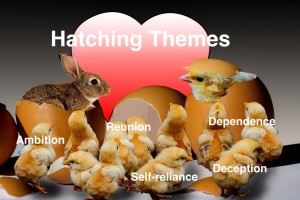“A story without a theme is little more than a list of events.” —Grace Jolliffe
Never again, in a novel proposal, during a pitch, or at a social event, stare blankly when asked, “What is your story’s theme?”
Get a handle on what theme is.
Expert 1
James Scott Bell gives several pointers about developing your theme in his book, Plot & Structure.
- He says developing the theme is part of plotting.
- He defines it as “the take-home value” of our story. It’s “the lesson or insight.”
- He suggests we write our theme in one line.
- He calls the theme our “meta-message.” Although we’ll probably have “submessages,” there’s only one meta-message.
- He holds that themes deepen the story.
- He cautions us not to choose a theme and force our story into it.
- He supplies a simple rule to avoid the danger of forcing a story: “Characters carry theme.”
- He gives an example from The Brothers Karamazov: “Faith and love are the highest values of human existence.”
Bell says, “Develop your characters fully and set them in the story world where their values will conflict with each other. Allow your characters to struggle naturally and passionately. Theme will emerge without effort.”
Expert 2
Susan May Warren and Rachel Hauck talk about theme in their book, From the Inside … Out.
- They define theme as the overall idea of the story.
- They equate theme to the story question.
- They suggest we write the theme in the form of a question.
- They maintain that the story question drives the story.
- They say the story question “answers a deeper question for us all, a question of the heart or mind. It’s the GREAT ‘what if.’”
- They give an example for The Hunt for the Red October: “Can a man from one country know the heart and mind of man from another?”
It sounds to me that we first recognize the short theme, such as betrayal. Warren and Hauck suggest we write out what we’re saying about betrayal, and then turn the “statement into a question and make it specific to your character.”
Like Bell, Warren and Hauck believe your character is what drives the ultimate theme.
Jump Start Your Ultimate Theme
Let the online lists of common story themes below help you grasp what it is your characters show or learn about life. Then write the one line Bell suggests to capture the specific theme or the story question Warren and Hauck propose.
- 101 Common Story Themes by Grace Fleming
- Examples of Themes by Grace Jolliffe
Here’s a sample of themes from these blog posts:
- “Identity crisis” (Fleming)
- “Necessity of work (Fleming)
- “Alienation – The effects of, the loneliness of, to cure it.” (Jolliffe)
- “Survival – man versus nature” (Jolliffe)
Having trouble with your story’s theme? See what experts say. Click to tweet.
What is the theme of the story you’re working on?





 RSS - Posts
RSS - Posts



Definitely great stuff to keep in mind. Thanks Zoe!
Good luck and God’s blessings.
PamT
Thanks, Pam. I just wrote a story question for the story I’m working on.
Great info. Thanks for sharing.
Sally Jo, I’m sure some of this was familiar to you from Susie’s classes. The points in the post have helped me get a handle on theme. Good to know for proposals.